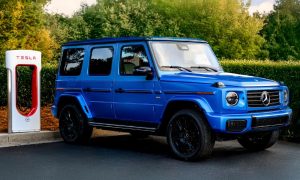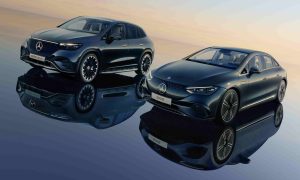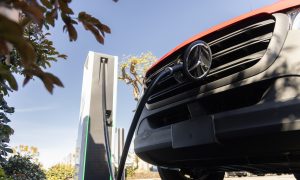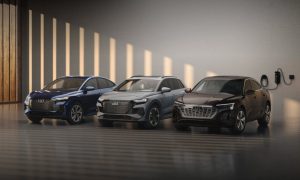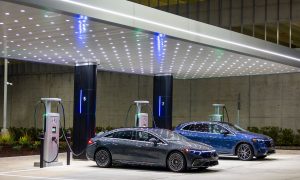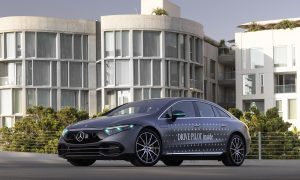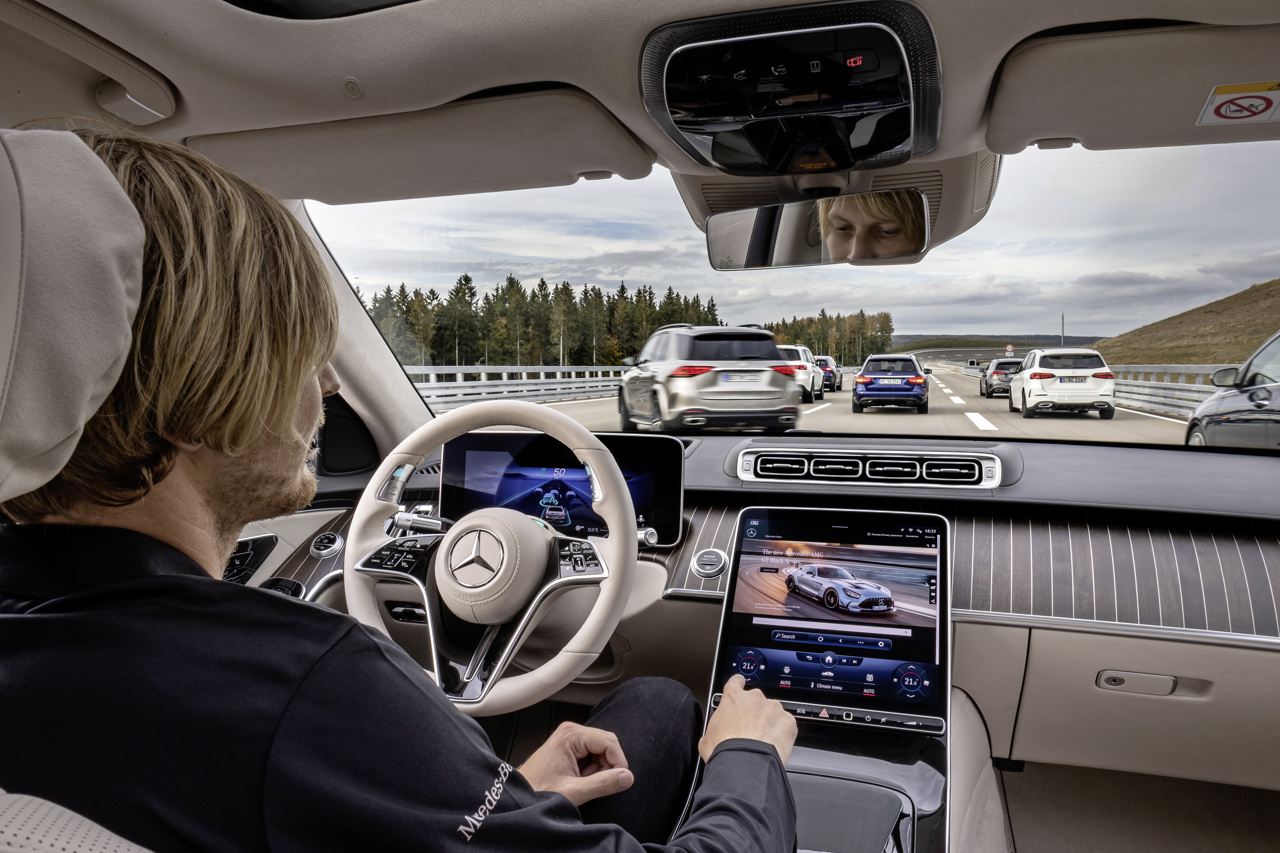

News
Mercedes-Benz DRIVE PILOT captures world’s first approval for hands-free driving
Mercedes-Benz DRIVE PILOT has captured the world’s first approval for ‘conditionally automated’ driving on German highways with its Level 3 system. The German automaker’s DRIVE PILOT is the first internationally valid system, as it met the requirements of Global Automotive Regulation No. 157, which concerns the approval of vehicles with regards to Automated Lane-Keeping Systems.
Mercedes-Benz announced the accomplishment, calling it proof of the company’s “pioneering work in automated driving.” The German Federal Motor Transport Authority granted the approval.
“For many years, we have been working to realize our vision of automated driving. With this LiDAR-based system, we have developed an innovative technology for our vehicles that offers customers a unique, luxurious driving experience and gives them what matters most: time. With the approval of the authorities, we have now achieved a breakthrough: We are the first manufacturer to put conditionally automated driving into series production in Germany,” Member of the Board of Management of Daimler AG and Mercedes-Benz AG, Chief Technology Officer responsible for Development and Purchasing Markus Schäfer said.
Die Bedienelemente für den DRIVE PILOT sitzen im Lenkradkranz oberhalb der Daumenmulden rechts und links. Aktiviert der Fahrer den DRIVE PILOT, regelt das System Geschwindigkeit und Abstand und führt das Fahrzeug souverän innerhalb der Spur. // The controls for DRIVE PILOT are located in the steering wheel rim above the thumb recesses on the right and left. If the driver activates DRIVE PILOT, the system regulates speed and distance and guides the vehicle confidently within the lane.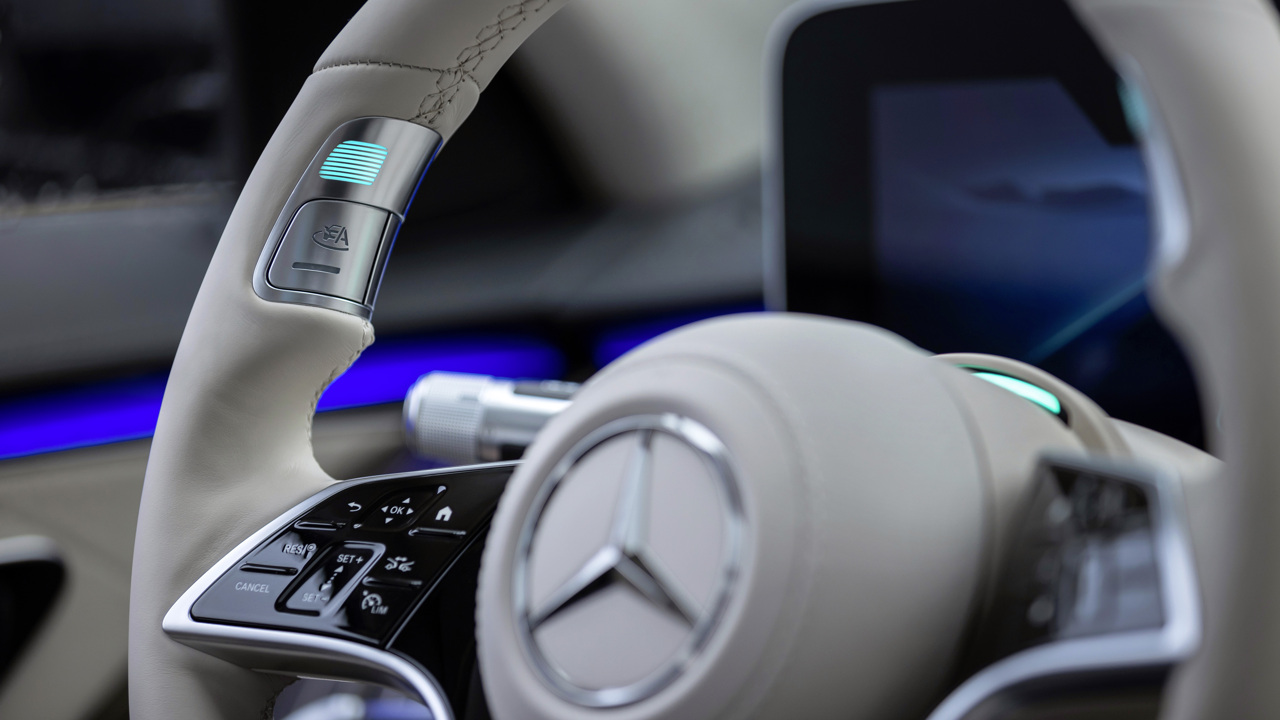
DRIVE PILOT will first be available in Mercedes-Benz S-Class models in the first half of 2022. There will be initial limitations with the functionality’s ability, and drivers will only be able to drive at speeds of up to 60 km/h or 37 MPH on German highways. This will effectively limit the Level 3 system to operating in “heavy traffic or congested situations on suitable stretches of highway in Germany.” Regularly flowing traffic patterns at speeds that exceed the approved limits will require a normal driving operation.
Levels of autonomous driving have been outlined by the Society of Automotive Engineers (SAE). Level 3 Autonomy does not require humans to perform the act of driving. However, of the three levels that allow hands-free driving, which are Levels 3, 4, and 5, Level 3 is the only category in which the driver must take over if the vehicle requests human intervention. Level 3 is effectively described as a “traffic jam chauffeur,” which would align with the capabilities of the DRIVE PILOT system.
“During the conditionally automated journey, DRIVE PILOT allows the driver to take their mind off the traffic and focus on certain secondary activities, be it communicating with colleagues via In-Car Office, surfing the internet, or relaxing while watching a film. In DRIVE PILOT mode, applications can be enabled on the vehicle’s integrated central display that are otherwise blocked while driving,” the automaker wrote.
The system will initially be available on 8,197 miles or 13,191 kilometers of German highway. Mercedes-Benz said that it is working on completing extensive test drives in other markets, including the U.S. and China, so that it can launch DRIVE PILOT in countries outside of Germany.
DRIVE PILOT in der S-Klasse: Hochautomatisiertes Fahren auf Deutschlands Autobahnen // DRIVE PILOT in the S-Class: Conditionally automated driving on German freeways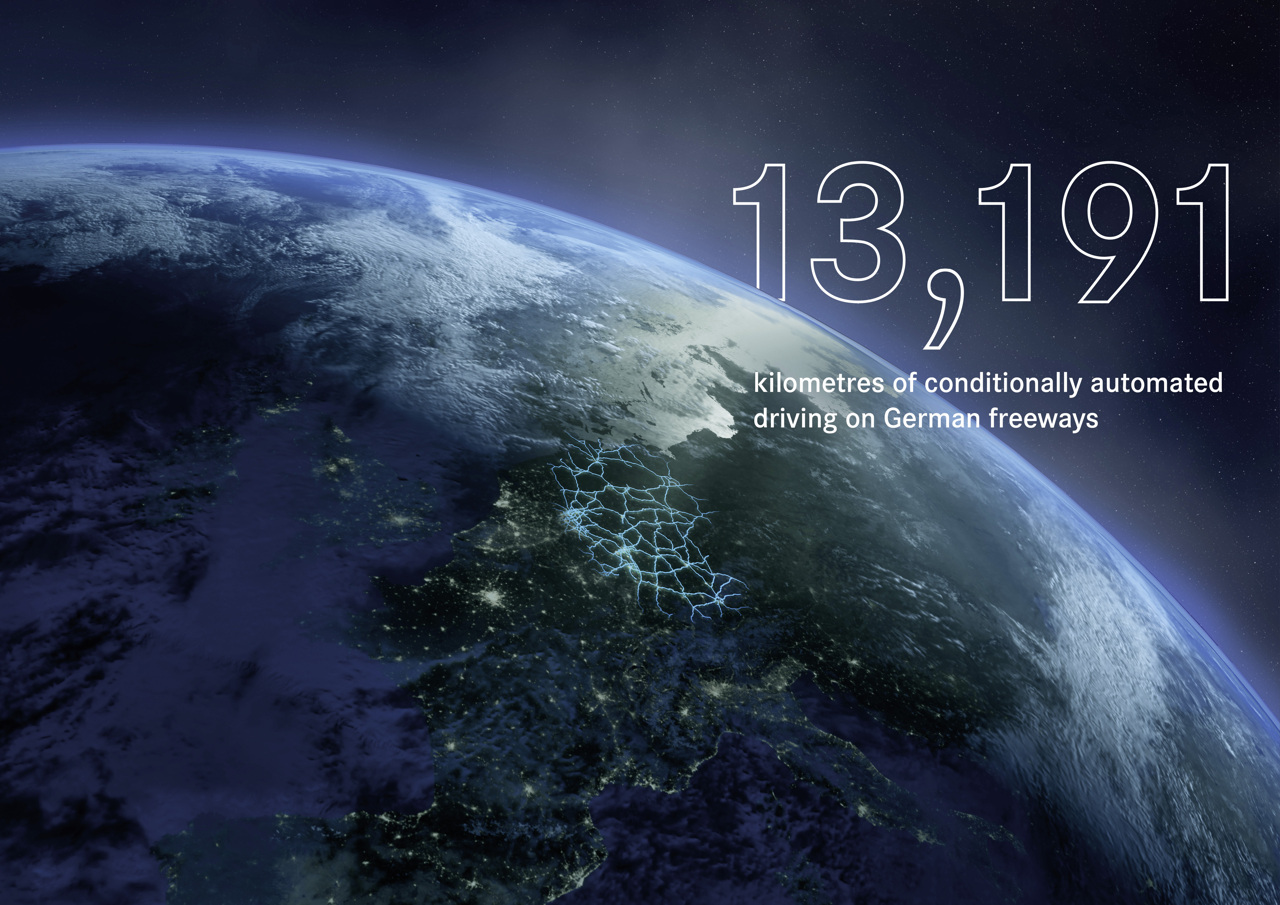
DRIVE PILOT uses a LiDAR-based system for operation, but it also has a camera in the rear window and a microphone, which will both be used to detect approaching emergency vehicles by recognizing flashing blue lights and sirens. There is also a moisture sensor in the wheel well, used for detecting slippery or wet driving conditions. A digital HD map will transmit information regarding road geometry, route profile, traffic signs, and unusual traffic events, including accidents or road work, to DRIVE PILOT, helping it make informed and logical decisions throughout the vehicle’s operation.
Mercedes-Benz also said that it has implemented a safety system that will inform the driver of when the vehicle needs to be back in the control of a human. If the driver fails to take back control of the car for any reason, including medical emergencies, the vehicle’s braking system will bring the car to a stop in a controlled manner while also activating hazard lights. Mercedes-Benz has an emergency call system, which will automatically contact first responders, and the vehicle’s doors and windows will unlock for easier access for first responders.
Mercedes-Benz has been working to get DRIVE PILOT approved by regulators since mid-2021.
I’d love to hear from you! If you have any comments, concerns, or questions, please email me at joey@teslarati.com. You can also reach me on Twitter @KlenderJoey, or if you have news tips, you can email us at tips@teslarati.com.
News
Tesla Robotaxi has already surpassed Waymo in this key metric
Tesla Robotaxi has already overtaken Waymo in Austin in one key metric, but there’s still more work to do.

Tesla Robotaxi has already surpassed Waymo in one extremely important key metric: size of service area.
Tesla just expanded its service area in Austin on Monday morning, pushing the boundaries of its Robotaxi fleet in an interesting fashion with new capabilities to the north. Yes, we know what it looks like:
🚨 Tesla’s new Robotaxi geofence is…
Finish the sentence 🥸 pic.twitter.com/3bjhMqsRm5
— TESLARATI (@Teslarati) July 14, 2025
The expansion doubled Tesla Robotaxi’s potential travel locations, which now include the University of Texas at Austin, a school with over 53,000 students.
The doubling of the service area by Tesla has already made its travel area larger than Waymo’s, which launched driverless rides in October 2024. It became available to the public in March 2025.
According to Grok, the AI agent on X, Tesla Robotaxi’s current service area spans 42 square miles, which is five square miles larger than Waymo’s service area of 37 square miles.
Tesla Robotaxi (red) vs. Waymo geofence in Austin.
Much can be said about the shape… but the Robotaxi area is now ~3.9 mi² (10 km²) larger than Waymo’s!! pic.twitter.com/dVfh2ODxJC
— Robin (@xdNiBoR) July 14, 2025
The service area is one of the most important metrics in determining how much progress a self-driving ride-hailing service is making. Safety is the priority of any company operating a ride-hailing network, especially ones that are making it a point to use autonomy to deploy it.
However, these companies are essentially racing for a larger piece of the city or cities they are in. Waymo has expanded to several different regions around the United States, including Arizona and Los Angeles.
Tesla is attempting to do the same in the coming months as it has already filed paperwork in both California and Arizona to deploy its Robotaxi fleet in states across the U.S.
As the platform continues to show more prowess and accuracy in its operation, Tesla will begin to expand to new areas, eventually aiming for a global rollout of its self-driving service.
News
Tesla Megapacks arrive for massive battery replacing coal plant
Tesla Megapacks have started arriving on-site to the Stanwell Battery Project, just as Queensland prepares to wind down the Stanwell coal plant.
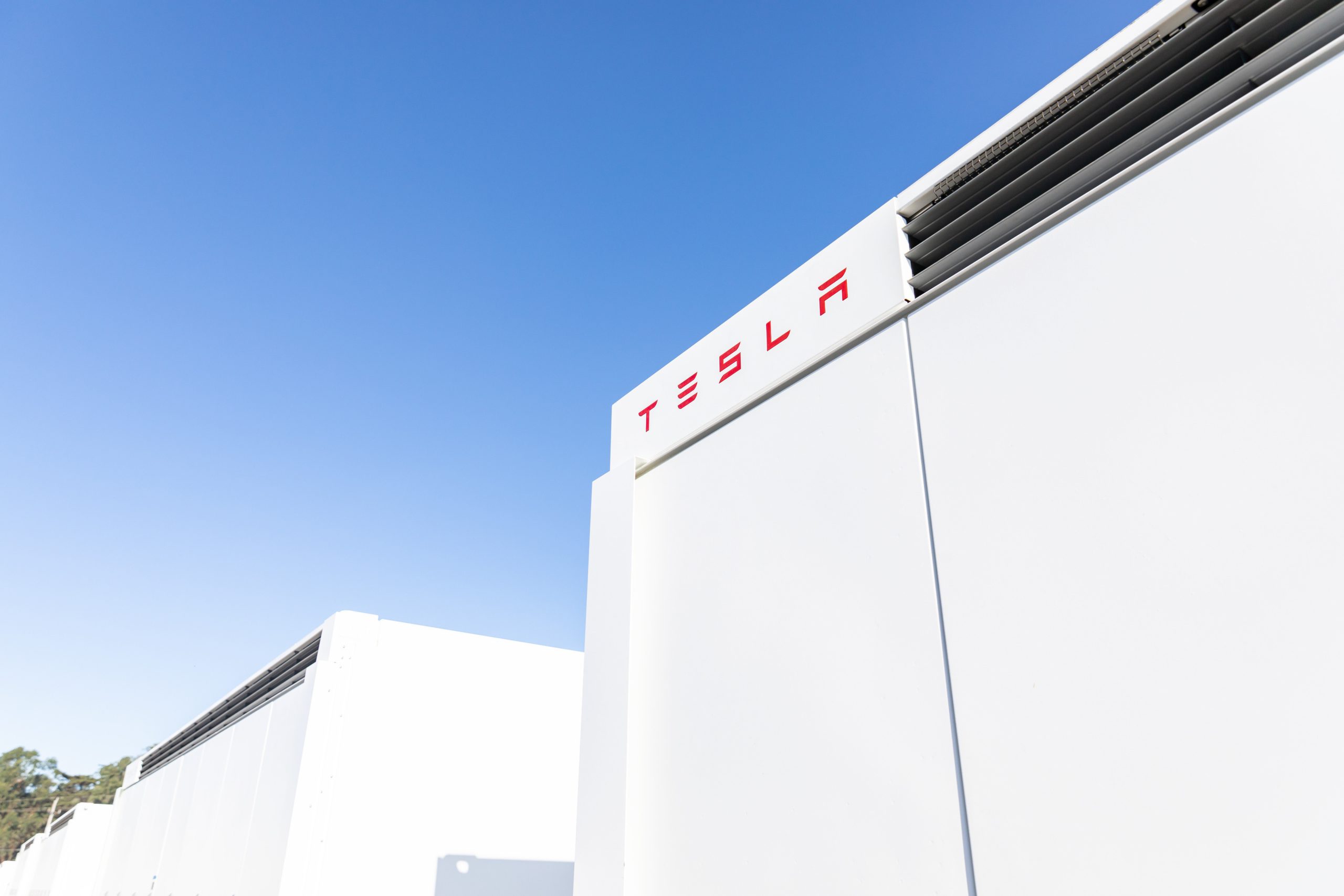
The first of over 300 Tesla Megapacks have arrived to the site of a massive battery energy storage system (BESS) being built in Australia, dubbed the Stanwell Battery Project after a coal plant it’s set to replace.
In a press release last week, the Stanwell Battery Project announced that the first Tesla Megapack 2XL units had arrived to the site, which is located outside of Rockhampton in Queensland, Australia. The project will eventually feature 324 Megapack units, set to arrive in the coming months, in order to support the 300MW/1,200MWh battery project.
“The Stanwell Battery is part of the diversification of our portfolio, to include cleaner and more flexible energy solutions,” said Angie Zahra, Stanwell Central Generation General Manager. “It is just one part of the 800 MW of battery energy storage capacity we have in our pipeline.
“Capable of discharging 300 MW of energy for up to four hours (1,200 MWh), our mega battery will be one of the largest in Queensland.”
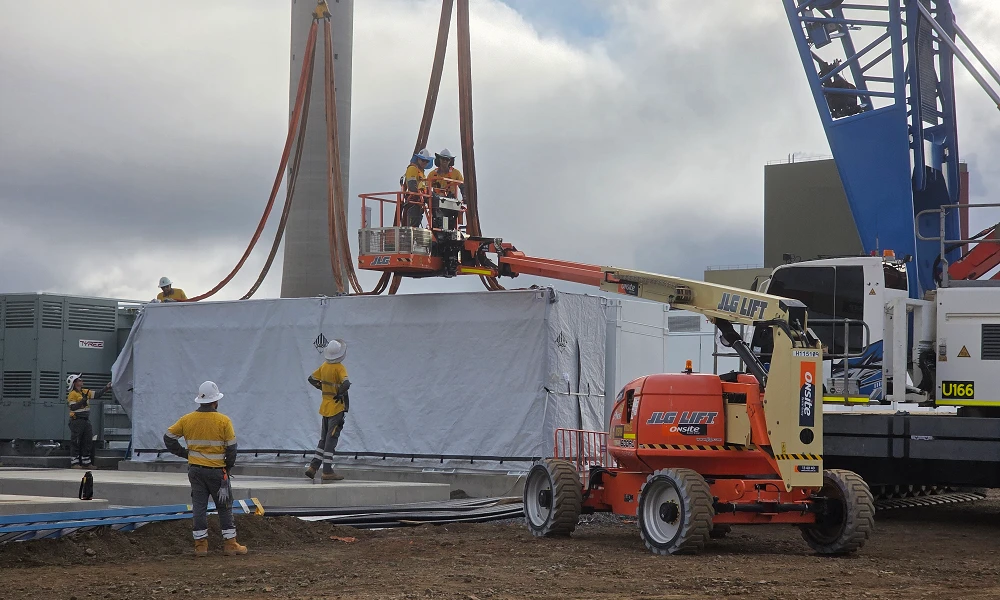
Credit: Stanwell
Did you know Tesla’s Lathrop facility churns out a Megapack every 68 minutes? That’s enough energy to power 3,600 homes for an hour per unit! ⚡️ pic.twitter.com/bG6fpHkB9O
— TESLARATI (@Teslarati) June 11, 2025
READ MORE ON TESLA MEGAPACKS: Tesla Lathrop Megafactory celebrates massive Megapack battery milestone
The state is working with government-owned company Yurika to facilitate construction, and the process is expected to create roughly 80 jobs. The project is expected to come fully online in May 2027, with initial commissioning of the Megapacks aiming for November 2025.
The Stanwell Battery is set to replace the nearby Stanwell coal generation plant, which the government is planning to wind down starting in 2026 as part of efforts to reach an 80 percent renewable energy generation ratio by 2035. Meanwhile, the government is also set to begin winding down the Tarong and Callide coal plants, while several other Megapack projects are being built or coming online. o ya
Tesla currently has two Megapack production facilities, located in Lathrop, California, in the U.S. and another that came online earlier this year in Shanghai, China. The Shanghai Megafactory shipped its first units to Australia in March, while both factories are expected to be capable of producing 10,000 Megapack units per year upon reaching volume production.
News
The Tesla Diner is basically finished—here’s what it looks like
The company first broke ground on the Diner, Drive-in, and Supercharger location in September 2023. Now, it has served one of its first internal customers.

Tesla has finally completed the construction of its highly anticipated Diner, Drive-in, and Supercharger in Los Angeles, and recent photos of the interior’s “retro-futuristic” style are making their way around the internet.
X user Brad Goldberg shared photos from the Tesla Diner site last Tuesday, depicting some of the Supercharger stalls, indoor and outdoor seating areas, multiple neon lights, and even an Optimus robot. Goldberg also noted that there had been a “flurry of activity on site” while he was snapping the photos last week, suggesting that the restaurant location could be getting close to opening.
The Tesla Diner also served one of its first internal customers in the past few days, as Elon Musk posted on X on early Monday morning that he had just finished up eating a meal at the site:
I just had dinner at the retro-futuristic Tesla diner and Supercharger.
Team did great work making it one of the coolest spots in LA!
The photos also show that the site is pretty much done, with some of them even showing vehicles charging at the charging stalls.
You can see some of the latest photos of the Tesla Diner below.
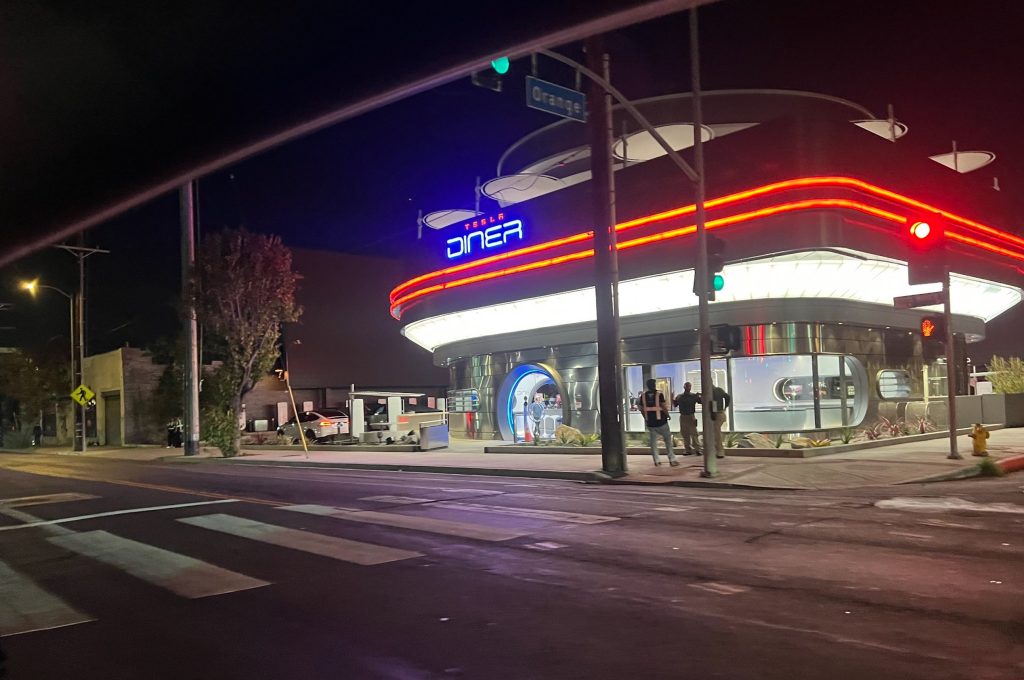
Credit: BradGoldbergMD | X
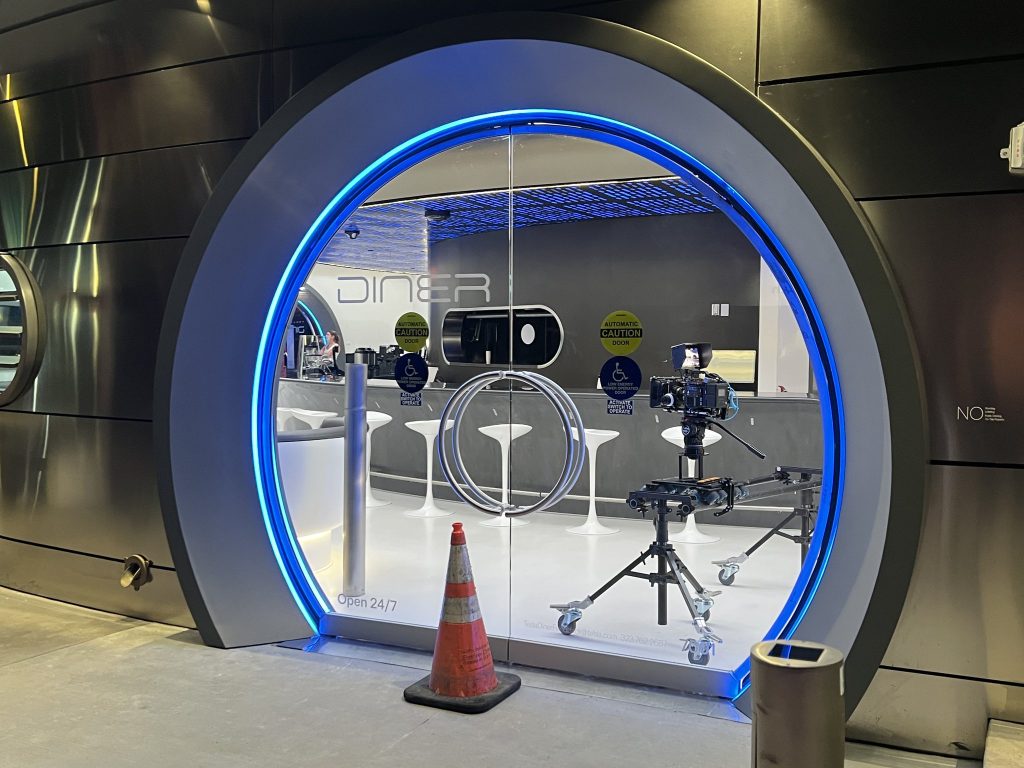
Credit: BradGoldbergMD | X
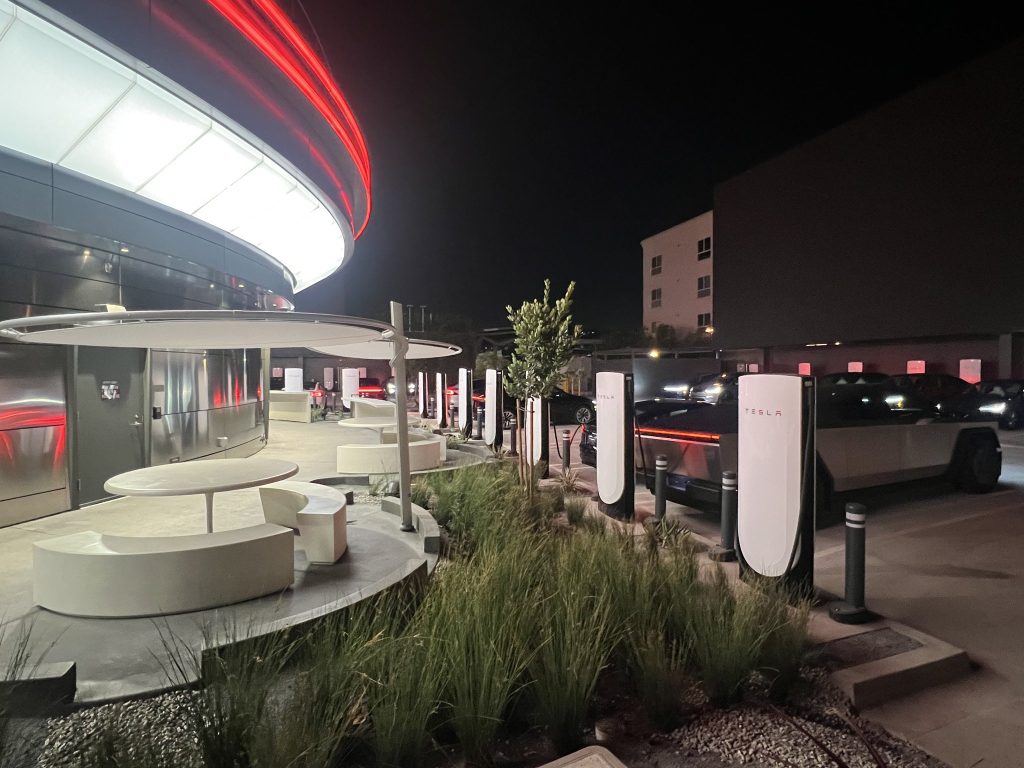
Credit: BradGoldbergMD | X
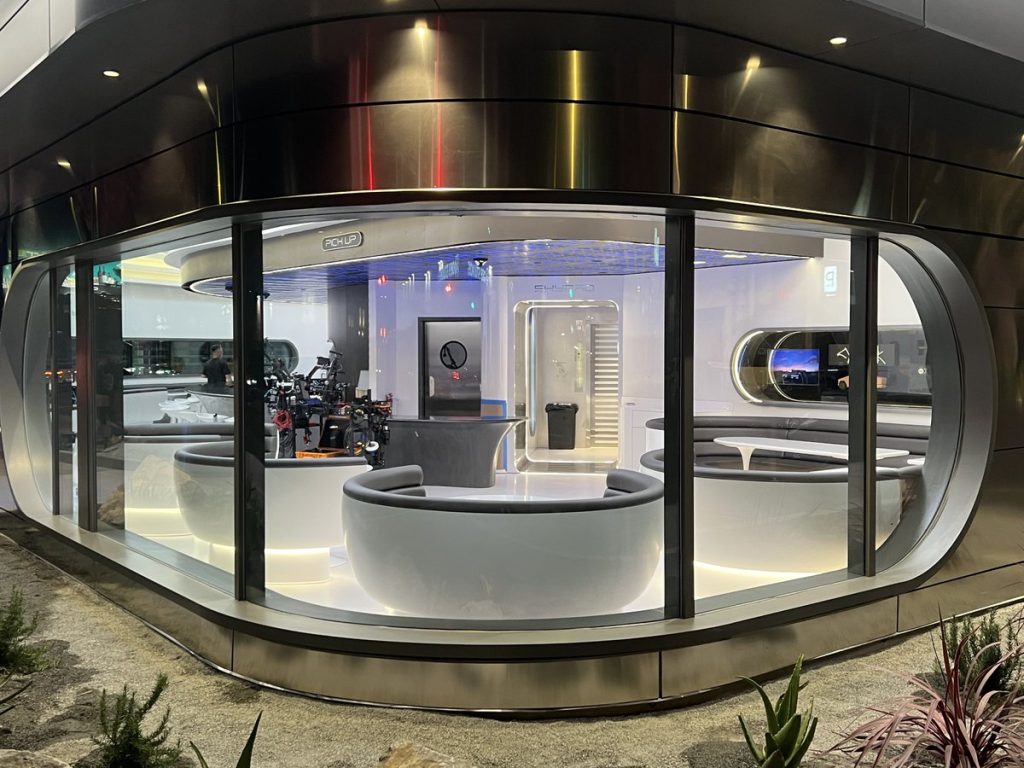
Credit: BradGoldbergMD | X
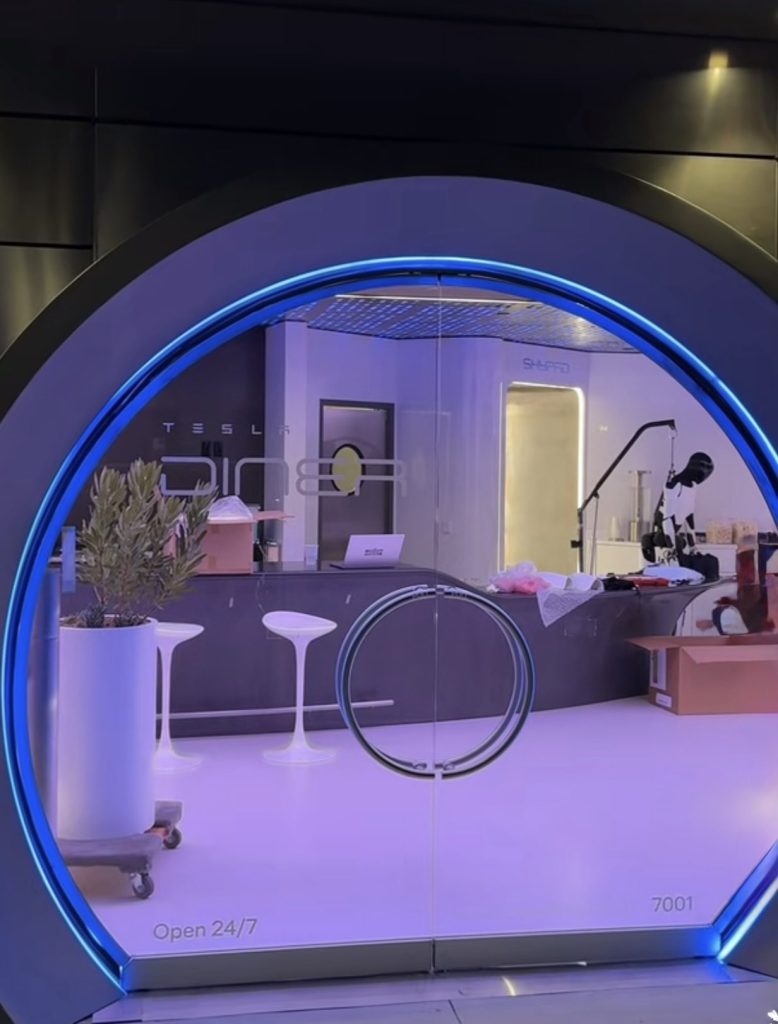
Credit: TeslaKing420 | X
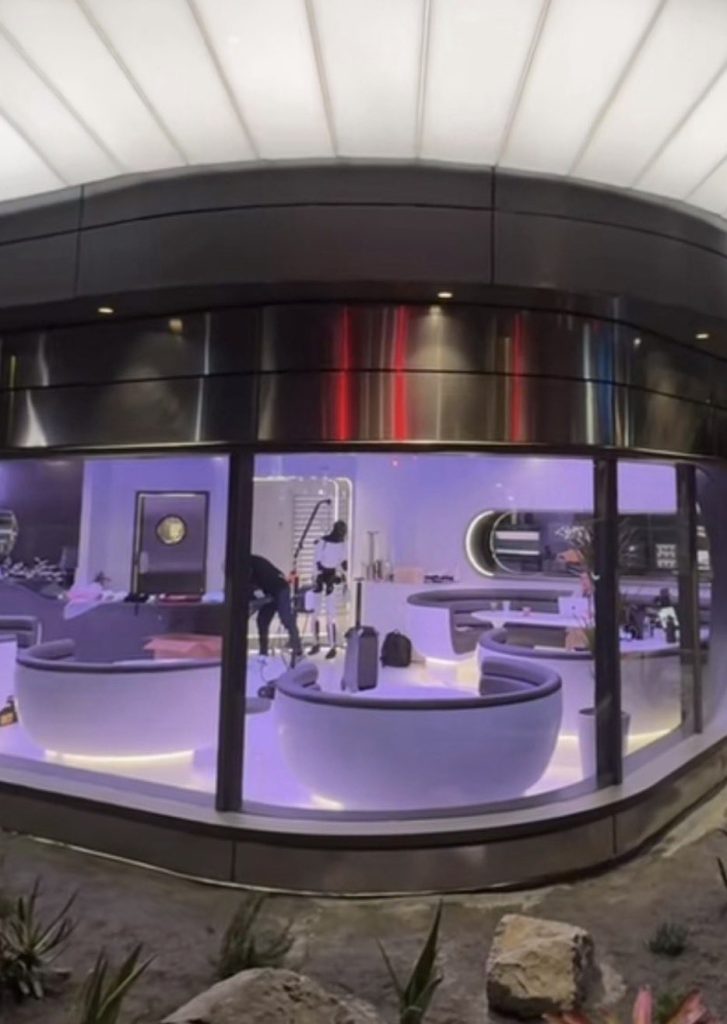
Credit: TeslaKing420 | X
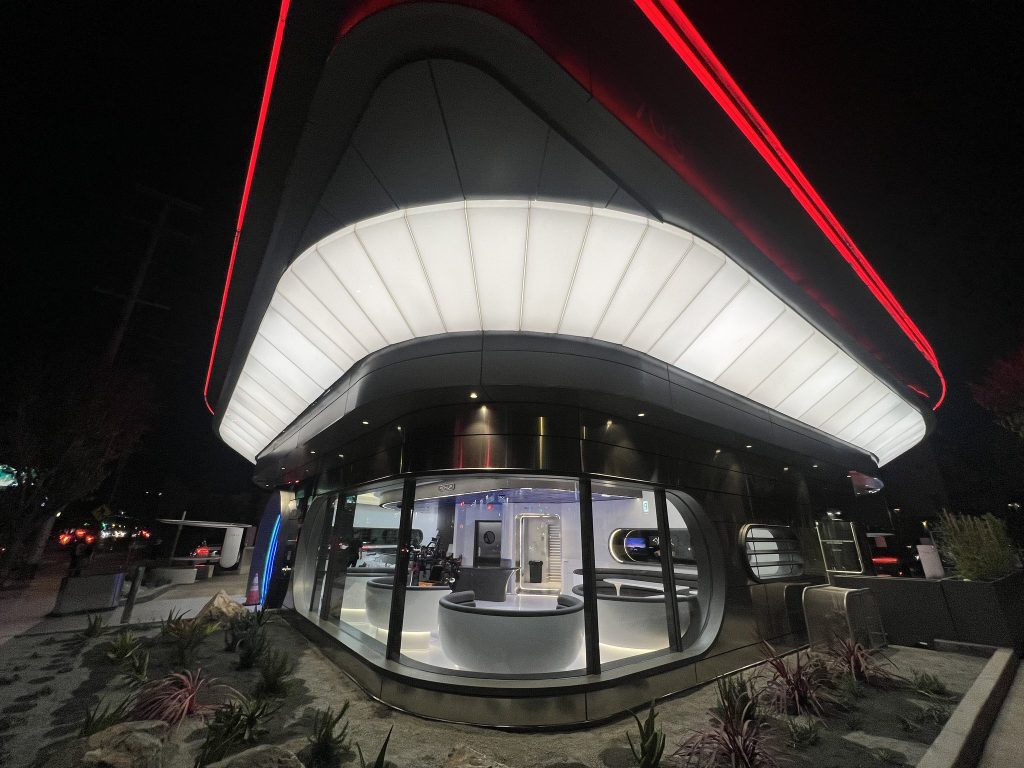
Credit: Brad Goldberg (via Sawyer Merritt on X)
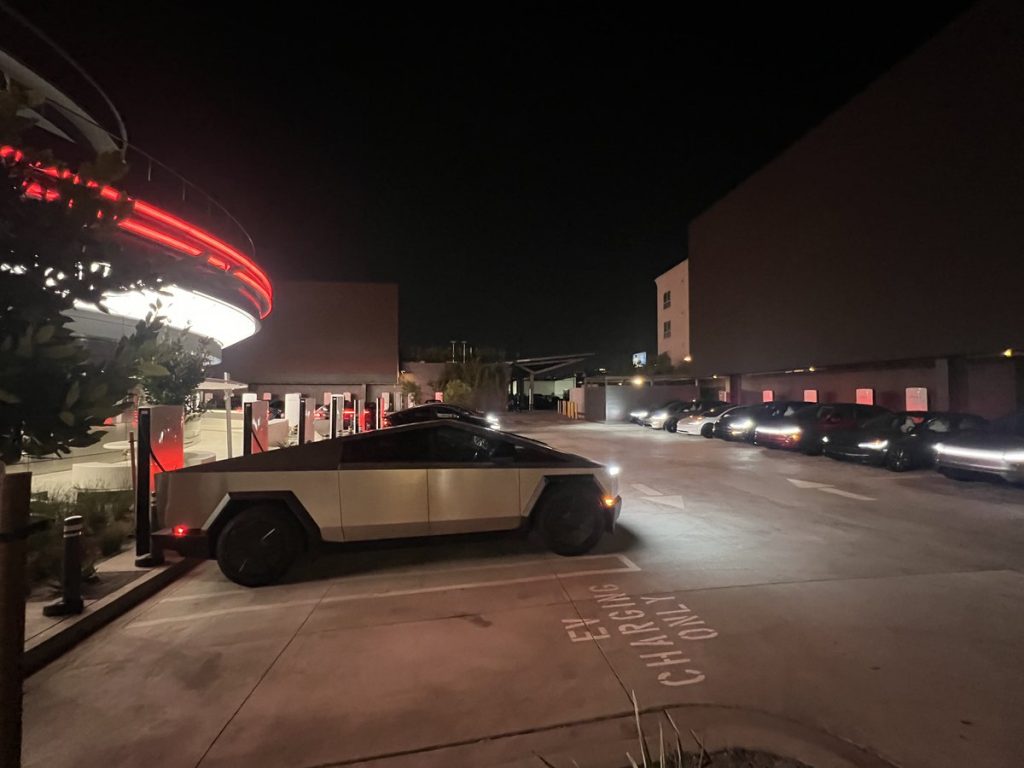
Credit: Brad Goldberg (via Sawyer Merritt on X)
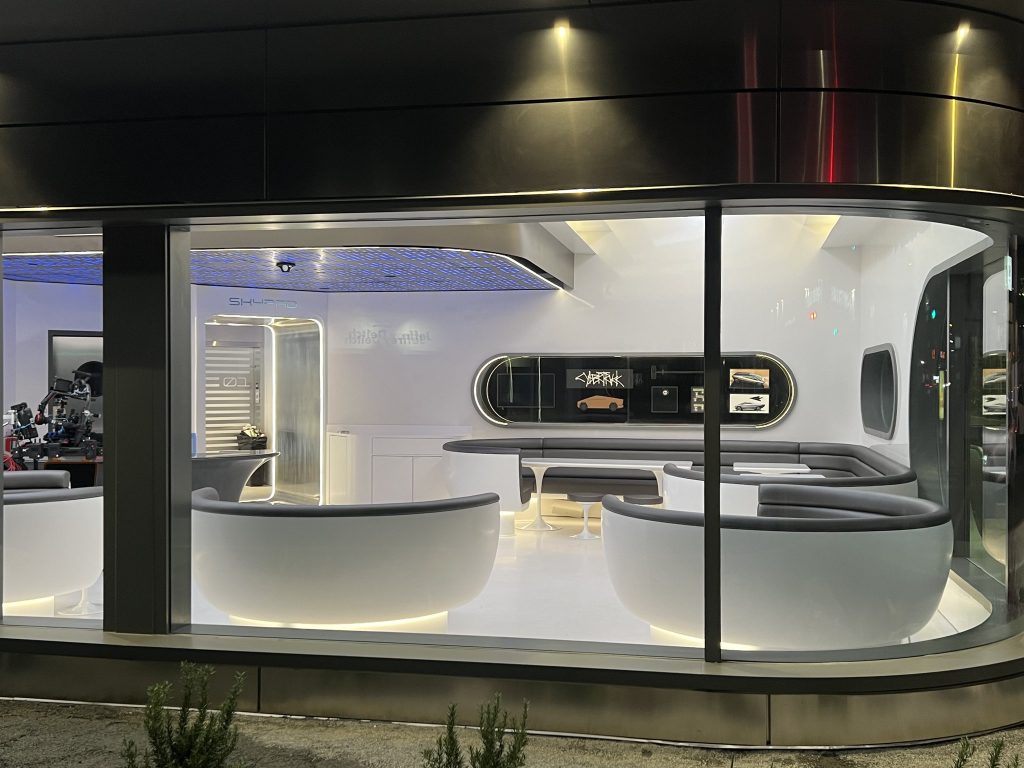
Credit: Brad Goldberg (via Sawyer Merritt on X)
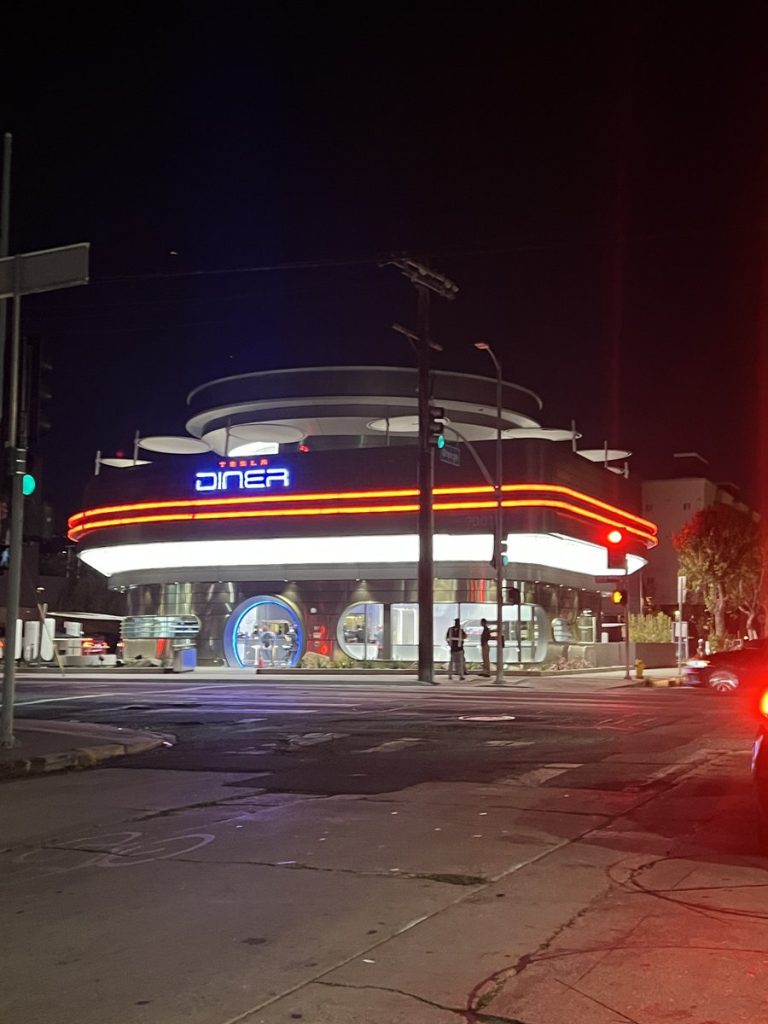
Credit: Brad Goldberg (via Sawyer Merritt on X)
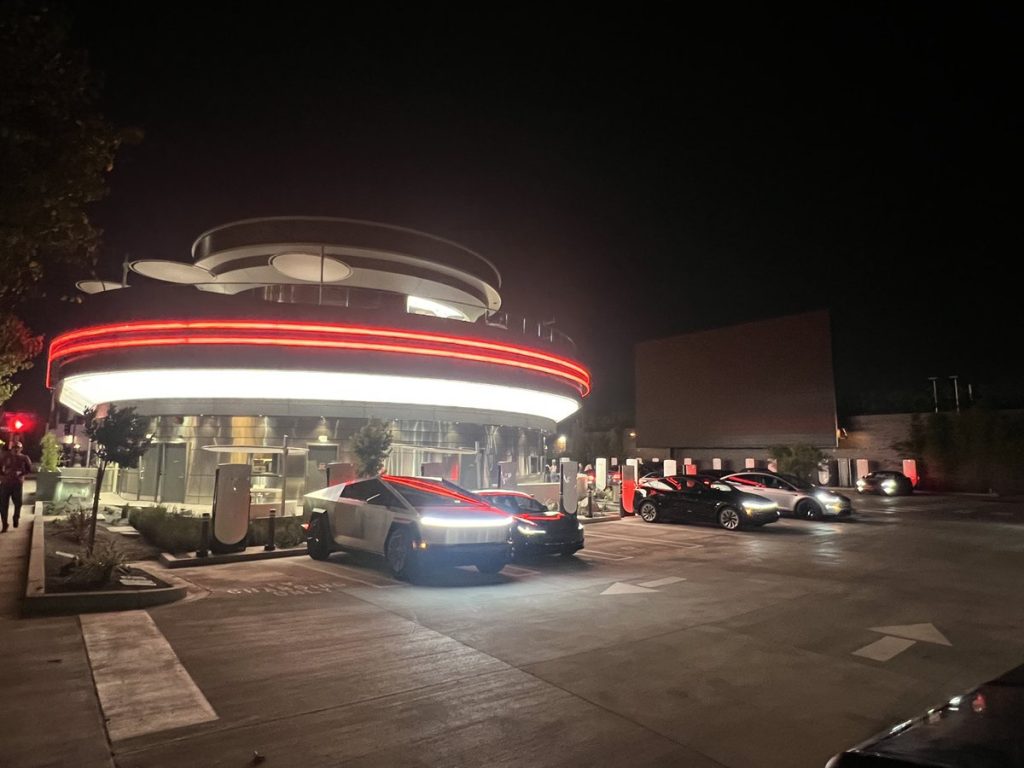
Credit: Brad Goldberg (via Sawyer Merritt on X)
READ MORE ON TESLA’S LA DINER: Tesla readies Drive-In Diner Supercharger for launch with app inclusion
When will the Tesla Diner open to external customers?
While it’s still not open to external customers yet, the news again suggests that the company could be close to an official opening date. Tesla first broke ground on the Diner in September 2023, after receiving a wave of building permit approvals throughout that year. Teslarati also covered much of the construction progress throughout last year, including when crews installed the first and second drive-in screens.
Located at 7001 West Santa Monica Boulevard, the idea was first discussed in 2018 by Musk and a few others on Twitter, featuring 1950s rock and roll, waiters on roller skates, and drive-in movie theater screens playing clips from some of history’s best movies. Notably, the photos of the front doors also show that the site will be open 24 hours a day, 7 days a week, whenever it does end up opening.
Tesla’s progress on Supercharger with diner, drive-in seen in aerial footage
-

 Elon Musk2 weeks ago
Elon Musk2 weeks agoTesla investors will be shocked by Jim Cramer’s latest assessment
-

 News2 days ago
News2 days agoTesla debuts hands-free Grok AI with update 2025.26: What you need to know
-

 Elon Musk4 days ago
Elon Musk4 days agoxAI launches Grok 4 with new $300/month SuperGrok Heavy subscription
-

 Elon Musk7 days ago
Elon Musk7 days agoElon Musk confirms Grok 4 launch on July 9 with livestream event
-

 News2 weeks ago
News2 weeks agoTesla Model 3 ranks as the safest new car in Europe for 2025, per Euro NCAP tests
-

 Elon Musk2 weeks ago
Elon Musk2 weeks agoxAI’s Memphis data center receives air permit despite community criticism
-

 News4 days ago
News4 days agoTesla begins Robotaxi certification push in Arizona: report
-

 News2 weeks ago
News2 weeks agoTesla sees explosive sales growth in UK, Spain, and Netherlands in June


